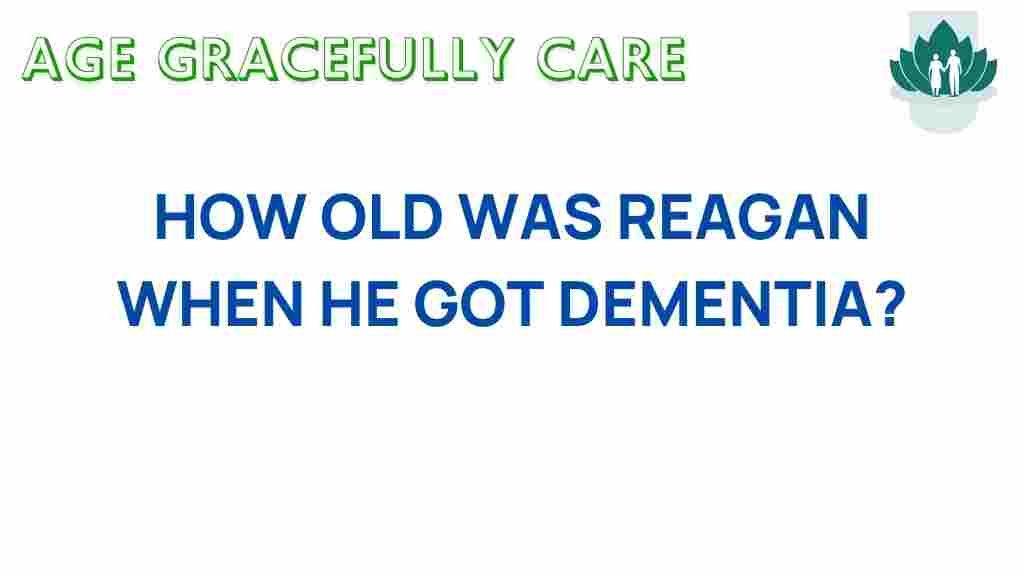The Age of Alzheimer’s: Reagan’s Battle with Dementia Explored
The late Ronald Reagan, the 40th President of the United States, is often remembered for his charismatic leadership and significant impact on American politics. However, his battle with dementia and Alzheimer’s disease in the latter part of his life sheds light on a critical issue that affects millions of Americans today. As we explore Reagan’s struggle with dementia, we also delve into the broader context of Alzheimer’s disease, its implications on health, memory, and awareness, particularly as it relates to aging populations.
Understanding Alzheimer’s Disease
Alzheimer’s disease is a progressive neurological disorder that leads to cognitive decline, impacting memory and various cognitive functions. It is the most common cause of dementia, affecting millions worldwide. Understanding the stages and symptoms of Alzheimer’s is crucial for awareness and early intervention.
- Early Stage: Memory loss, difficulty finding words, and minor confusion.
- Middle Stage: Increased forgetfulness, confusion about time and place, and difficulty recognizing faces.
- Late Stage: Severe memory loss, inability to communicate, and dependence on caregivers.
Reagan’s diagnosis in 1994, five years after leaving office, brought significant attention to the disease, emphasizing the need for awareness and research.
Reagan’s Journey with Dementia
In November 1994, Ronald Reagan publicly disclosed his Alzheimer’s diagnosis through a poignant letter, stating, “I have recently been told that I am one of the millions of Americans who will be affected by Alzheimer’s disease.” This announcement was significant, as it not only marked the personal battle of a former president but also highlighted a growing health crisis linked to aging populations.
Reagan’s experience with dementia provides valuable insights into the intersection of health, memory, and politics. His cognitive decline over the years was a poignant reminder of the fragility of human health and the devastating effects of Alzheimer’s on families and society.
The Historical Context of Alzheimer’s and Politics
Alzheimer’s disease has a long history, but it gained prominence in the late 20th century as researchers began to understand its implications. Politically, the awareness of Alzheimer’s disease and dementia has significant ramifications:
- Healthcare Policy: The increasing prevalence of Alzheimer’s has led to changes in healthcare policy, advocating for better care and funding for research.
- Awareness Campaigns: Reagan’s diagnosis prompted various initiatives aimed at raising awareness and supporting affected families.
- Research Funding: Increased funding for Alzheimer’s research has been a critical political issue, with many advocating for more resources to combat the disease.
Reagan’s battle with dementia not only changed the conversation around the disease but also inspired a shift in how society perceives aging and cognitive decline.
Impact on Family and Society
The effects of Alzheimer’s extend beyond the individual. Families often bear the emotional and financial burdens of caregiving. Reagan’s family, for instance, faced the challenges of supporting a loved one while navigating the public scrutiny that comes with being a former president.
Some of the impacts include:
- Emotional Toll: Caregivers often experience stress, anxiety, and depression.
- Financial Strain: The cost of care can be overwhelming, leading to financial hardships for families.
- Social Isolation: Families may become isolated as they focus on caregiving responsibilities, leading to a loss of social connections.
Raising awareness about these challenges is essential for creating support systems for families affected by dementia.
Steps to Increase Awareness and Support for Alzheimer’s
As we reflect on Reagan’s journey with dementia, it’s vital to consider actionable steps to enhance awareness and support for those affected by Alzheimer’s:
- Educational Campaigns: Promote public education on the signs and symptoms of Alzheimer’s to encourage early diagnosis.
- Support Groups: Establish support networks for families to share experiences and resources.
- Advocacy for Research Funding: Encourage political advocacy for increased funding for Alzheimer’s research.
- Community Engagement: Engage communities in discussions about aging and health to foster understanding and support.
Through these initiatives, we can create a more informed society that supports those living with Alzheimer’s and their families.
Troubleshooting Common Misconceptions about Alzheimer’s
Despite increased awareness, several misconceptions about Alzheimer’s persist, which can hinder understanding and support for those affected. Here are some common misconceptions and the realities behind them:
- Myth: Alzheimer’s is a normal part of aging.
Reality: While age is a significant risk factor, Alzheimer’s is a specific disease that is not a normal part of aging. - Myth: Only older adults can get Alzheimer’s.
Reality: Younger individuals can also be diagnosed with early-onset Alzheimer’s, sometimes in their 30s or 40s. - Myth: Alzheimer’s only affects memory.
Reality: Alzheimer’s affects various cognitive functions, including reasoning, problem-solving, and emotional regulation.
Addressing these misconceptions is crucial for fostering a greater understanding of the disease and its implications.
Conclusion: A Call to Action
Ronald Reagan’s battle with dementia serves as a significant reminder of the importance of awareness surrounding Alzheimer’s disease. As we age, the risk of developing dementia increases, making it imperative that we advocate for better understanding, support, and resources for those affected. By raising awareness and fostering discussions, we can create a society that not only recognizes the challenges posed by Alzheimer’s but also actively seeks solutions.
For further reading on Alzheimer’s disease and the ongoing research efforts, you can visit the Alzheimer’s Association. Additionally, to learn more about the impact of political figures on health policies, check out this insightful article ….
As we move forward into the age of Alzheimer’s, let us honor the legacy of those, like Reagan, who faced this disease with courage and dignity, by advocating for greater awareness and support.
This article is in the category Health and created by AgeGracefullyCare Team
